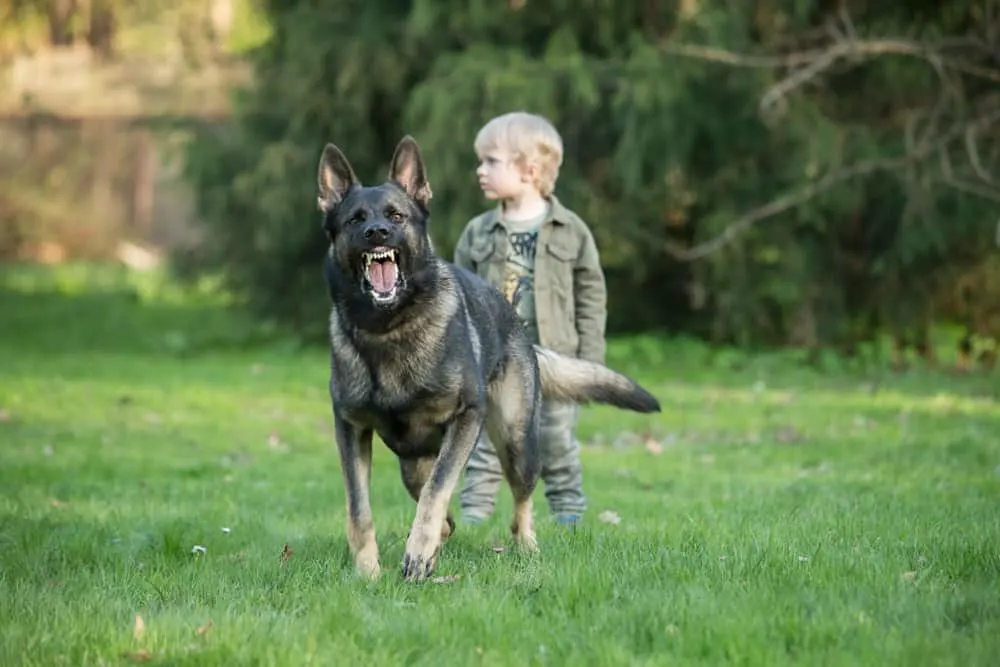Do German Shepherds Bark A Lot? Your Guide to GSD Barking
For people who live out in the country or a rural area, having a companion dog that barks a lot may not be much of an issue.
But if you want to have a pet dog and you live in an urban or inner-city area, you may have lots of other people (and pets) living right next to you!
In this case, it is worth taking some extra time to ask whether German Shepherds bark a lot and if this is the right dog breed for your living situation and neighborhood.
By the time you finish reading this article, you will have the information you need about German Shepherd dogs barking to decide if this is the right dog for you.
You will also get tips on what to do to control GSD barking issues.

Do German Shepherds Bark? Yes, They Do!
German Shepherds do bark. Without proper training and socialization, a GSD can bark a lot.
Even with proper training and socialization, German Shepherds are said to be “more vocal” than many other breeds of companion canines.
Why is this?
The answer is simple. It is because the German Shepherd dog was bred and developed to do a specific type of work, herding, and protection.
Today, German Shepherds are no longer needed as much to serve as livestock herding and guarding dogs. So the breed is now sought after to work in serving, guarding and protecting.
One of the many ways German Shepherds excel at this job is with aggressive barking.
The loud, ferocious sounding bark that an adult German Shepherd can make is often enough to keep potential predators or criminals (of any species) at bay.
Even the sound of the German Shepherd’s bark has been deliberately bred into this dog from the start.
What Does a Barking German Shepherd Dog Sound Like?
The sound of a German Shepherd dog barking can change markedly from puppyhood to adulthood, even though this is a relatively short amount of time.
As this short YouTube video highlights, the GSD’s puppy bark sound is quite high pitched and shrill.
But as a German Shepherd puppy grows into adulthood, the bark sound deepens and becomes more resonant and forceful.
Your dog may also discover that they can howl and start to howl as well, especially at night.
Why Do German Shepherds Bark So Much?
You have already learned that German Shepherds as a dog breed have a long and regal history of serving as livestock herding and guarding dogs and as service and protection dogs for people.
But can there be other reasons why a German Shepherd would bark a lot?
There can be several other reasons that might cause your GSD to bark more than usual.
1. Your German Shepherd is bored
A bored dog of any breed is often a barking dog. Dogs can get bored just like people get bored.
While this may not be as much of a problem in some dog breeds that are more like “couch potatoes,” in a true working dog breed like the German Shepherd, boredom can be a huge trigger to bark.
Barking is a way your dog communicates to let you know they are bored and want some activity or a job to do. This type of barking is unlikely to resolve on its own.
Boredom can also lead to other undesirable behaviors like digging and chewing things around the house!
2. Your German Shepherd is lonely
German Shepherd dogs don’t tend to do very well when they are left alone for hours at a time, especially if this pattern is consistent.
This is a dog breed that truly has been bred and developed to live and work alongside their people.
Some dog owners think it is sufficient to get a lonely German Shepherd another dog to have as a playmate.
Unfortunately, this doesn’t work for the GSD because these dogs are true people dogs. They want to be with you.
For this reason, it is important not to bring a German Shepherd into your home and life if you are not able to be present and available to your dog for the majority of each day.
3. Your German Shepherd is sick or hurt
While dogs have evolved to have many tools to communicate with people, talking in human words is not one of those tools.
So your dog has to resort to other ways to let you know if they are hurt or sick. One of those ways can be barking.
While barking may not be the way your dog chooses to let you know they are sick or hurt, if the barking doesn’t appear to have any other cause, it is time to dig deeper.
The health issue may be external or it might be internal. For example, some dogs that are having dietary issues or hormonal issues might become more aggressive or irritable and bark more.
Mood changes are one of the primary signs that your dog may be developing an underlying health issue, and barking more is one of the primary signs of a mood change.
This is the right time to reach out to your dog’s veterinarian to report what you are witnessing and, if necessary, make an appointment for your dog to be examined.
4. Your German Shepherd feels threatened
If your German Shepherd feels threatened in any way, you can expect your dog to start barking.
The same holds true if your dog perceives that you are being threatened.
Because the German Shepherd has such a strong guarding and protective drive, your dog will always be on the lookout for potential threats and will likely bark as a way to alert you.
5. Your German Shepherd is excited
Just like kids, puppies can easily become over-excited. As puppies, German Shepherds may bark when they get worked up through play, training sessions or exercise.
Even as adults, if your GSD gets very excited about something or someone, including a favorite visitor, a tasty treat or the presence of another dog or animal, you can expect to hear some vigorous barking.
6. Your German Shepherd is anxious or afraid
Even though the German Shepherd is an intensely big, strong, powerful dog, these dogs are just as vulnerable to becoming anxious and afraid as the next dog, especially during the puppyhood stage of life.
A well-trained, well-socialized German Shepherd is going to be less likely to exhibit fearfulness or anxiety, but this may still be a problem if your dog is suddenly left alone a lot.
As well, unexpected changes like a move to a new home, the addition of a new family member (human or animal), a change in your schedule or seasonal events such as fireworks that are less common can all trigger anxious or fearful barking.
You have probably already noticed that the need for strong, early and ongoing training and socialization is a common theme throughout this article.
This need is not just because the GSD is a very strong and powerful dog. It is also because the German Shepherd is an intensely people-oriented dog.
But don’t expect your GSD to figure out on their own how to deal with strange people or strange animals. For this, extended training and frequent socialization are required.
As the American Kennel Club (AKC) points out, early and ongoing training and socialization will turn an unruly puppy into a well-mannered adult dog.
You can find out a lot more information about what professional German Shepherd breeders and trainers recommend on the website for the German Shepherd Dog Club of America (GSDCA).
8. Your German Shepherd is being provoked
Sometimes, no matter how much training and socialization you provide and how hands-on you are in your German Shepherd dog’s life, they will get provoked by something or someone.
When a GSD is provoked, barking is a natural and instinctive response.
While a well-trained German Shepherd is less likely to get provoked, if the circumstances are perceived as being extreme, it can still happen.
Examples here include (but are not limited to) these types of situations:
- The nearby presence of a female dog (of any breed) in heat.
- Another dog getting too close to the fence.
- A dog-ignorant person (or small unaware child) taunting or teasing your dog.
- The sudden appearance of a squirrel or another “trigger animal.”
What Training Tips Can Help a German Shepherd Dog Stop Barking?
The German Shepherd Rescue of New England (GSRNE) offers this helpful video showing how to train your GSD to just give one quick bark when there is someone (or you) at the door and then be quiet.
Consistent training using only positive reinforcement methods is the number one way to control a German Shepherd’s barking.
Barking is one big reason why German Shepherd dogs get relinquished to rescue shelters or sanctuaries.
Sometimes this is because a former owner realizes they simply chose more dogs than they are equipped to handle.
Other times this is because the owner thinks that an adult dog cannot be trained to become a well-socialized member of a community and family.
In most cases, this is not the issue. Rather, it is either that the German Shepherd has a history of past neglect or abuse or simply that the dog has never been taught what is and is not acceptable behavior.
Here are some great training tips to manage your German Shepherd barking.
1. First, identify the sources of any “problem barking” issues
You may not need to do this if you are just starting to train your German Shepherd puppy or rescue dog.
But if you are having a specific issue with barking, the first thing to do is to identify what the root cause is – you can refer back to the earlier list here for some of the most common triggers for problem barking.
2. Always use only positive reinforcement training methods
Here, “positive reinforcement” basically means praise, pats, play and treats rather than punishment.
Not only does positive reinforcement always work much better than negative reinforcement (punishment methods) but positive training is essential for an intelligent, large, strong breed like the GSD.
It is the only safe way to train your dog.
3. Use a clicker tool as a training aid
Using a clicker – a small handheld device (or even a click from your tongue in a pinch) is a great way to train only the behaviors you want your dog to exhibit.
The goal is to pair the rewards, whether that be a treat, a pat, praise or something else desirable, with the click sound so your dog knows what to do to get the reward.
4. Be consistent over time with your dog’s training
Dogs, like kids, are very aware when an adult is being consistent versus inconsistent.
Because the German Shepherd is among the smartest of all dog breeds, you can expect your dog to notice if you slack off the training even slightly.
Maintaining consistency is the number one thing you need to do to ease issues with problem barking.
Is It Possible to Train a German Shepherd to Never Bark?
Since German Shepherds are known to be a more vocal breed in general, you will want to establish the difference between a “normal” and an “unusual” level and volume of barking.
So aiming for the goal to eliminate barking is not just nearly impossible but would likely result in a very emotionally unhealthy GSD.
If you need a dog that does not bark, the German Shepherd is not the right breed for you.
So now you know that the German Shepherd dog is more vocal. You also know that training can help resolve barking issues.
Frequently Asked Questions
Is it Normal for a German Shepherd to Bark a Lot?
Yes, it is completely normal for German Shepherds to bark a lot, as it is their natural instinct to do so.
They tend to bark a lot in order to express their feelings and emotions, and they might also bark due to excitement.
If your German Shepherd is bored, you can also expect them to start barking, as they usually need some form of mental stimulation to keep them entertained.
Some of the most common reasons for German Shepherds barking include:
- Guarding/territorial instincts
- Boredom/ Separation Anxiety
- Aggression
Some German Shepherd dog owners will try to ignore this barking habit, but you should know that it is possible to train your dog to control their barking.
These are intelligent and highly trainable dogs that are eager to please, so training is definitely an option here.
How Do I Get My German Shepherd to Stop Barking?
If you want to get your German Shepherd to stop barking, you need to find out why they are doing so in the first place.
If your dog is territorial and barks at new people, you should try to assure them that new visitors and occurrences are not a threat to them.
To train them to understand otherwise, ignore them when they start to bark. When they eventually stop, say ‘quiet’ and give them a treat. Repeat this until they become calmer with strangers.
If your dog is barking out of boredom, make sure that you are providing them with enough mental and physical exercise.
Be sure to take them out for a walk every day, and find other ways to keep them occupied through the use of toys and additional training.
For aggression, you should always reward calm behavior with a treat. When your dog is showing aggressive behavior, stop praising them and start ignoring them.
Recommended reading: Why Do German Shepherds Sleep On Their Backs?






















